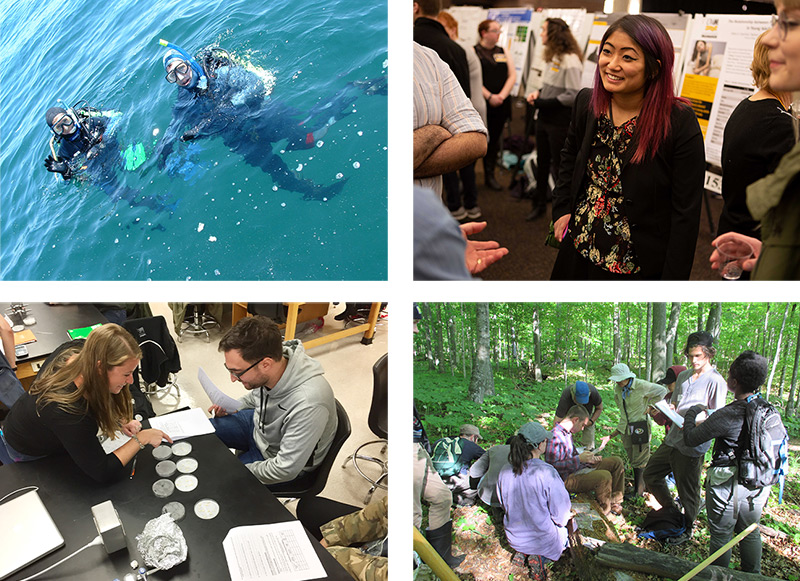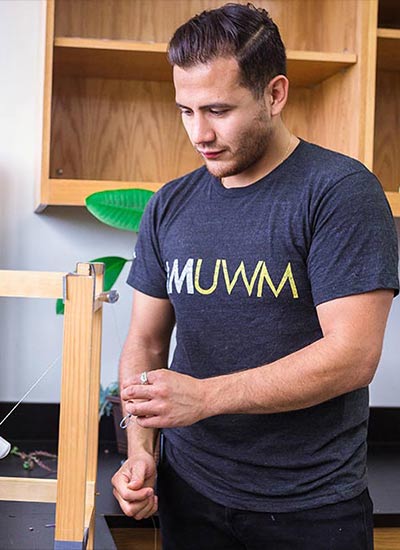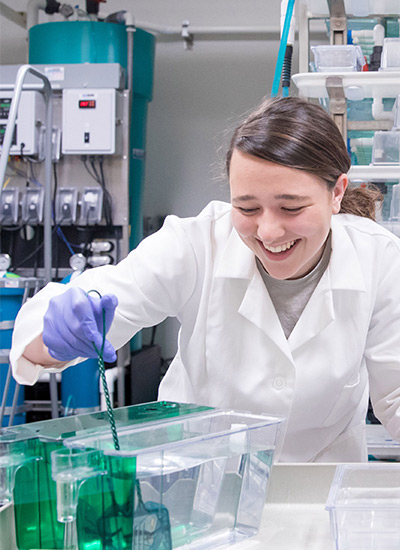Undergraduate research is a great opportunity to prepare you for a future career or graduate study. The experience will help you gain an understanding of the scientific process and help you develop practical skills in laboratory or field research techniques, problem solving, communication, teamwork, and data analysis.
An undergraduate research experience is the ideal way to explore a career in research, to gain practical experience, and to enhance your resume.
You will be working closely with a scientific mentor which provides the opportunity to clarify your career interests, formulate post-graduation plans, and to establish meaningful relationships with people to write future letters of recommendation.
The information provided below includes details for both formal course work opportunities (Independent Study 697/698/699) and more informal opportunities (volunteer and employment). The process for finding these opportunities is similar for both.

A successful research experience will set you apart from other job applicants.
Answers to your questions about Undergraduate Research:
What will I be doing?
How do I find a faculty mentor and apply for Independent Study?
When should I start?
How much time should I be prepared to commit to research?
How will I be graded for an undergraduate research Independent Study?
Learn about Support for Undergraduate Research Fellows (SURF)
Sampling of Recent Undergraduate Research Projects
What will I be doing?
Undergraduate research varies and what you will be doing depends on the project that is designed between you and your scientific mentor. The goal of undergraduate research is to teach you practical skills and expose you to the broader scope of scientific research. This means going beyond lab work and includes data analysis, reading original research papers related to the topic, learning how to keep a laboratory notebook, presenting your research at local or national meetings, and writing a final research report. Many undergraduates have the opportunity to become co-authors on published manuscripts.
Completing an Independent Study 697/698/699 is a way to earn credits toward your Biology Major. This consists of a faculty lead research project that requires a written proposal for the project and pre-approval by the Department of Biological Sciences. The proposal form can be found here. It is expected that you complete the proposal form in collaboration with your faculty mentor.
A maximum of 6 Independent study research credits can apply towards your major requirements. Independent Study (697/698/699) courses may be counted as your capstone requirement with the approval of your academic advisor.
How do I find a faculty mentor and apply for Independent Study?
A. If you have completed some introductory biology courses:
You should start by researching Biological Sciences Department faculty profiles and personal lab web pages. This will give you an idea of what each faculty member is working on. Read journal articles and other publications to help you become more knowledgeable about that field. Next, seek out professors who do research in your field of interest and inquire about their lab. Send them an introduction email and be sure to include the following information:
- Introduce yourself and state what attributes you have to offer.
- Tell them what you are looking for (experience, volunteer work, independent study credit, number of hours and semesters).
- Tell them why you are writing to them (their research interests, you know someone in their lab, you were referred to them, you took a course with them).
- Include an unofficial transcript, resume, or Curriculum Vitae (C.V.).
Once you have identified a faculty mentor:
Discuss and agree upon an independent study project with your faculty mentor. Your faculty mentor must email Dorothy Kidwell with your name, email address and course number (BIO SCI 699, 698, 697, or 695) to request permission for you to enroll in an independent study course. Dorothy will send you and your faculty mentor an email with a link to the electronic Independent Study Form. Once you enroll in the course in PAWS, you will be able to initiate the electronic form. Work with your mentor to draft and finalize the independent study proposal. The faculty mentor must complete and submit the electronic form with the finalized proposal. Once submitted, your proposal will go through an approval process. You and your faculty mentor will receive a confirmation email once the proposal is approved. Final Independent Study products are due to the office by the last day of finals and should be emailed to Dorothy upon completion.
What if the professor I contact says “no”?
Do not be discouraged! You may need to contact several professors before you are able to set-up a research project. When you talk with a professor who does not have a suitable project or space available in their lab, ask if they can recommend a person you could speak with next. You may have to go through a few “no’s” to get to a “yes”, but it only takes one yes!
B. If you are early in your University career:
Opportunities exist through the Office of Undergraduate Research (OUR) UROP program. The Office of Undergraduate Research provides details about available projects and will match you with a mentor. You will register for a 1-3 credit course under the Undergraduate Research Opportunity Program (UROP) heading. Freshmen and sophomores will also register for a 1-credit UROP Seminar which consists of a weekly meeting and debriefing with other students in the UROP program.
For additional information, please contact the Office of Undergraduate Research.
When should I start?
The earlier the better! Do not wait until your senior year; it will limit your experience and opportunities. Many professors are willing to take students with no prior research experience. It is often recommended that you volunteer in a research lab to gain experience prior to enrolling in an Independent Study.
How much time should I be prepared to commit to research?
In the Department of Biological Science, most faculty require students to commit to a 3-credit research experience. For three credits of research you would be expected to commit at least nine hours to the project per week. You should discuss all expectations with your faculty mentor.
How will I be graded for an undergraduate research Independent Study?
If you register for Independent Study in the Department of Biological Sciences, you will receive a grade. Please note that in this “class” you will not have exams. As part of your independent study proposal, you and your faculty mentor will agree how the grade will be determined and what the criteria will be. Generally, students either submit a paper or give an oral presentation at the end of the semester.
Support for Undergraduate Research Fellows (SURF)
The UWM Office of Undergraduate Research (OUR) offers Support for Undergraduate Research Fellows (SURF). The program is designed to foster faculty-student research collaborations. Funds are provided to give students the opportunity to engage in thoughtful and progressively sophisticated research programs of the principal investigator. Faculty and academic staff can apply for the awards to provide an hourly wage for undergraduate students working as research assistants. Students will be paid as hourly employees.
These awards are part of larger efforts to foster a culture of faculty-undergraduate research collaboration at UWM. The program invites proposals engaging lower-division students and students who have been underrepresented in undergraduate research, including students of color, students with disabilities and, in some disciplines, women.
For detailed information about the application process and the SURF program please click here.
Sampling of Recent Undergraduate Research Projects

- “Motility is important for competitive nodulation of Mimosa pudica by Paraburkholderia phymatum” Sara Saleh, Shashini U. Welmillage, and Faculty Mentor: Gyaneshwar Prasad
- “The Importance of Protein Interactions in Chemosensory Array Formation and Signal Transduction for Safe Biofilm Dispersal of Non-Motile Pseudomonas aeruginosa” Meredith Frank, and Faculty Mentor: Sonia Bardy
- “Visual Mate Choice in Eastern Gray Tree Frogs: Mated and Unmated Males Look Different” Samuel Murray and Faculty Mentor: Gerlinde Hobel
- “Going with the flow: silicate influxes from soil and grasses to the Milwaukee River” Stephan R. Girard, Allison M. Driskill, and Faculty Mentor: Erica B. Young
- “A genetic screen in Caenorhabditis elegansto identify novel inhibitors of Raf” Liliana Kasta, Anna Miller, and Evgeniy Nenaydykh, and Faculty Mentor: Claire de la Cova
- “Reduced growth and survival in larval zebrafish with Cabin1 gene knockout is associated with defects in feeding behavior and jaw morphology.” Sarah C. Sarich, Rocio Cruz, Jacob E. Exline , Majdulin N. Istiban , Wasef Mahmoud, Hilda Martinez Ramirez, Heather N. Waters , Kurt R. Svoboda, Brian A. Link, and Faculty Mentor: Ava J. Udvadia


